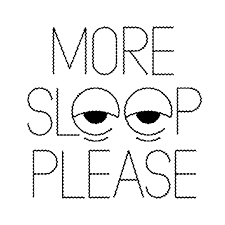At Night I Can’t Sleep, In the Morning I Can’t Wake Up
Do you get enough sleep? Most Americans don’t because we have trouble “turning off” our brains. Sleep is critical for not only recharging your mental and physical batteries, but also healing and even controlling our appetites.
How much sleep do adults need? The National Sleep Foundation recommends 7-9 hours for adults. Because each individual has different sleep needs, here is an easy way to determine yours. Note the time you go to bed on a night when you don’t need to set an alarm to wake up. Ideally, you haven’t had a heavy meal or too much to drink, as that will influence your ability to sleep well. The next morning, note the time you wake up. The time you slept without being awakened by artificial means is, unless you are chronically sleep deprived, a good estimation of your ideal sleep time. If you have a fitness tracker that monitors sleep, you can not only see your sleep and wake times, but some trackers will tell you how much and what kind of sleep as well as how many times you were awake during the night.
What is good sleep? Good sleep is an ebb and flow between light sleep and Rapid Eye Movement or REM sleep. REM sleep is when dreaming occurs. Non-REM sleep is when the body repairs and regrows tissues, builds bone and muscle, and strengthens the immune system.
What happens when we don’t get good sleep? The list is long, but sleep deprivation impairs attention, alertness, concentration, reasoning, and problem solving. Chronic sleep loss puts you at risk for a litany of health issues including heart attack and depression. There is a strong connection between diet and sleep. Poor sleep habits have a two-fold effect on eating—not sleeping enough makes us more inclined to eat poorly, and at the same time less able to exert control over our impulses to make good food choices.
Why don’t we get good sleep? Our addiction to technology is partly to blame. Late night stimulation from our computer, TV and phone stimulates our brain making it difficult to turn off at bedtime. Your body needs 15-30 minutes of technology-free time before you sleep. The environment in your bedroom can also influence the quality and quantity of sleep you get. Here are some tips for a sleep friendly bedroom.
- Make sure your bedroom is cool and dark.
- Make your bedroom a technology-free zone. A television in your bedroom is just as much an impediment to good sleep as your cell phone or laptop.
- Try to go to bed and wake up at about the same time every day. More than an hour of variance in sleep and wake times makes it harder to get consistent, good sleep.
We’ve all heard that laughter is the best medicine and exercise has been touted as good medicine too. Let’s add sleep to the list of healing practices we can do for ourselves.











